FINNISH CHRISTMAS CELEBRATION
Christmas Eve
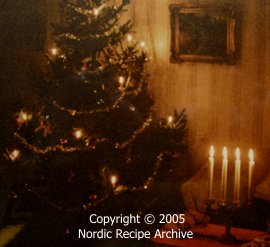 Unlike in most Christian countries, the highlight of the Finnish Christmas celebration is the Christmas Eve, December 24th, and not the Christmas Day itself.
Unlike in most Christian countries, the highlight of the Finnish Christmas celebration is the Christmas Eve, December 24th, and not the Christmas Day itself.
In the old town of Turku, the former capital of Finland, a special ceremony is held to declare the beginning of "Christmas peace" period, starting at 12 o'clock noon on Christmas Eve and lasting for twenty days.
The tradition of declaring Christmas peace is known to date back to 13th century.
It used to be common to all the Nordic countries, but only in Finland has it been maintained almost uninterruptedly up to our days.
In the declaration, the citizens are wished a merry Christmas and prompted to spend the Christmas time peacefully, avoiding "noisy and rowdy behaviour".
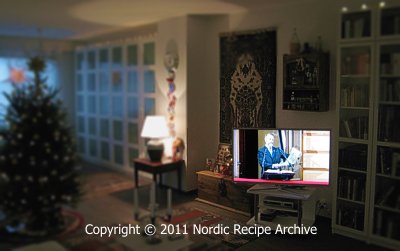 In picture on right: Finnish Christmas peace declaration being broadcasted live on television from the town of Turku on Christmas Eve noon.
In picture on right: Finnish Christmas peace declaration being broadcasted live on television from the town of Turku on Christmas Eve noon.
For many Finns, watching or listening to the declaration ceremony broadcasted live on television or radio signals the proper start of Christmas celebration.
 Although Finland is a rather secular country, the celebrating of Christmas here is still very pronounced when compared to most other Christian countries.
Although Finland is a rather secular country, the celebrating of Christmas here is still very pronounced when compared to most other Christian countries.
On Christmas Eve afternoon, the whole country seems to freeze down as the public transport ceases and most of the stores will be closed. It is still and quiet everywhere when people start getting prepared for the evening.
 Some people attend the Christmas Eve church service and many visit cemeteries to light candles on the graves of their deceased relatives and loved ones. Towards the darkening evening, the cemeteries are glowing with a sea of twinkling lights.
Some people attend the Christmas Eve church service and many visit cemeteries to light candles on the graves of their deceased relatives and loved ones. Towards the darkening evening, the cemeteries are glowing with a sea of twinkling lights.
Most Finns have a tradition of going to sauna to bathe and relax before attending the celebrations of the evening.
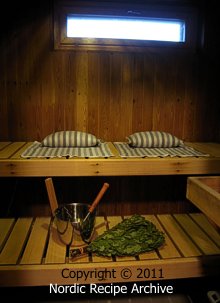 Warming up the sauna on Christmas is an ancient custom in Finland. Among the rural folk, it was believed that the spirits of dead ancestors came to bathe in sauna after sunset.
Warming up the sauna on Christmas is an ancient custom in Finland. Among the rural folk, it was believed that the spirits of dead ancestors came to bathe in sauna after sunset.
In picture on left: Christmas sauna warming up.
Sauna was regarded as a holy place where many important acts of life were carried out — from giving birth to dying and treating and healing of sicknesses.
Also today, the sauna in Finland is a symbol for purity.
For more information, visit The Finnish Sauna Society website.
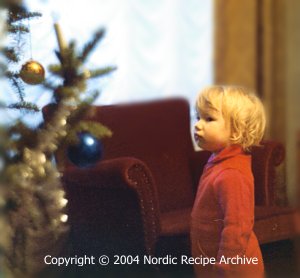

After the last preparations for the evening have been made, families from toddlers to great-grandparents gather together to have Christmas dinner.
Especially for children, this is a magical time full of joyous anticipation, and many adults as well have their warmest childhood memories linked to Christmas celebrations of the years past.
 Not to forget the true meaning of Christmas, it is a custom in some families to read aloud the Christmas gospel by St. Luke, describing the events at the time of the birth of Jesus. If there are young children present, the reading is usually done by the youngest literate child.
Not to forget the true meaning of Christmas, it is a custom in some families to read aloud the Christmas gospel by St. Luke, describing the events at the time of the birth of Jesus. If there are young children present, the reading is usually done by the youngest literate child.
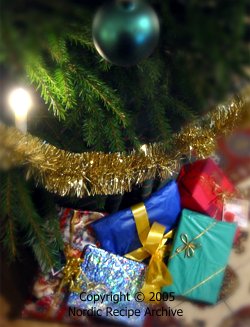 In picture above left: reading of the Christmas gospel.
In picture above left: reading of the Christmas gospel.
After the Christmas dinner, some families may have a visit from joulupukki, the Finnish Santa Claus. He will bring Christmas presents, which are placed under the Christmas tree.
In picture on right: Christmas presents under the Christmas tree.
Later in the evening, the presents will be handed out and opened.

Christmas Day and end of holiday season
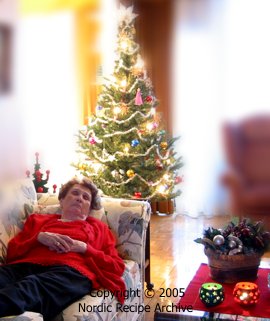 Christmas Day is usually spent quietly at home, relaxing and resting, with some people perhaps attending the early morning church service. The following St. Stephen's Day (Boxing Day) is traditionally a day for family visits.
Christmas Day is usually spent quietly at home, relaxing and resting, with some people perhaps attending the early morning church service. The following St. Stephen's Day (Boxing Day) is traditionally a day for family visits.
Previously, especially in rural areas, merry and boisterous horse-drawn sleigh rides were popular on St. Stephen's Day, as Saint Stephen is a patron saint of horses. Since the Middle Ages, it was a custom to race home from church after the service.
Following the old traditions, many horse farms and riding schools provide horse riding or sleigh rides on St. Stephen's Day.
The Christmas Eve, Christmas Day and St. Stephen's Day (from December 24th to 26th) are all public holidays in Finland.
Some people, especially parents with small children, may take leave from work until the New Year's Day to spend the holidays with the family. In the beginning of January, children start their school again.
After the Christmas holidays, it is time to get prepared to welcome the New Year.
Christmas time ends with Epiphany, January 6th. By this day, most people have already put away the Christmas ornaments and stripped down and thrown out the Christmas tree.
